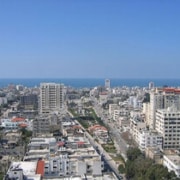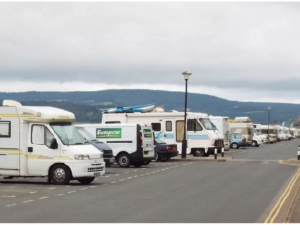Show Me the Numbers
One of the key components of preparing a presentation, or messages for a media interview, is to find and then communicate key numbers.
If you are at a dinner party or down the pub it is fine to have opinions without numbers. But, if you step into the world of professional communication, my advice is to bring some numbers with you.
In any explanation, numbers give some clear anchor points to an audience. They are often a very quick way to provide the equivalent of the first few broad brushstrokes on an artist’s canvas.

Gaza is among the most densely populated places on earth.
I was very struck by a hugely useful piece in the FT last week: The Gaza Strip in Charts. Whilst The FT team had gone to the trouble of publishing some fancy graphics, it was actually some key numbers that I thought provided the most useful insight.
- The population of Gaza is one of the youngest in the world with the median age (the point at which half the population is younger and half older) below 20. 19.6 to be exact. In the UK the figure is 40 and the global average 30.5.
- The population of Gaza has doubled since 2000. From 1.1 million to 2 million in 2020.
- Population density is similar to London but much higher in some places, equivalent to central Manhattan in some areas.
- The 8 refugee camps in Gaza feature the highest population densities in the world.
- Almost half the adult population is unemployed.
The FT did not add but perhaps could have done:
- The Gaza Strip is 25 miles long and less than 5 miles wide.
If you have been consuming lots of the war coverage in the last few days, you may be familiar with these numbers, but if you are not already briefed and don’t know the territory, this quickly gives you a lot of context and relevant information.
Numbers are nearly always essential when building an argument or explaining something. I have my own guidance on using numbers.
Firstly, raw data is rarely useful and always needs comparison or context. To use a happier more domestic example than the horrors of Gaza: lets look at UK Motorhome statistics. It is not useful to know that 11,500 new motorhomes were registered in the UK last year, if you don’t know that that was down on the 14,000 sold in in 2021, and the 15,300 sold in 2019.
Generally, percentages are more useful than raw data: motorhome sales down 18% in 2022 compared to the year before, seems easier all round.
Sometimes fractions work better than percentages for quick understanding. We could say new motorhome registrations were down by almost a fifth. I would probably stick to 18% but if it were 48% I would definitely claim it was almost half.
And ratios can be very useful.
6 out of 10 motorhome users are over 55
7 out of 10 motorhome users have no kids at home
4 out of 10 registered owners are women
(Source www.rvia.org)
To bring numbers to life and to create interest, comparison with other familiar reference points is a well-known device. The FT piece mentioned above, compares population density in Gaza to London and Manhattan. Football pitches and Olympic-sized swimming pools are often pressed into service to give a sense of scale to something physical. Apparently ‘the size of Wales’ is a phrase so often used or misused that it has become ‘a thing’ as explained in this BBC article.
As a speaker or writer, you do need to check accuracy and include the source of your numbers, where possible. But also curate them carefully. You can have too many numbers in an explanation, as well as too few. And you do have to work to make numbers interesting.
Finally, we all know that numbers can mislead, and there is now a whole BBC unit called ‘BBC Verify’, dedicated to fact-checking, as well as the excellent BBC Radio 4 programme and podcast More or Less. But these checks are necessary because numbers are powerful persuaders, and modern life is full of ‘fake news’.
If you believe people no longer trust statistics, it may be tempting to leave out hard data altogether. That would be a mistake. If you are in the persuasion game you should, I believe, be using a few choice numbers if you possibly can.
The Media Coach team provides media and presentation training as well as some message-building sessions for a wide variety of clients. If you think we might be able to help you or your colleagues, phone +44 (0)20 70992211, to talk to us, or email enquiries@themediacoach.co.uk.
Image: Gaza, Flickr – Israel Defense Forces – Gaza Buildings (1).jpg – Wikimedia Commons
Image: UK Motor Homes Creative Comms Licence.
- Media Savvy Operators Know How to Place a Quote - May 21, 2024
- The Magic of Performance - May 14, 2024
- Our Top Tips: - May 8, 2024





Leave a Reply
Want to join the discussion?Feel free to contribute!